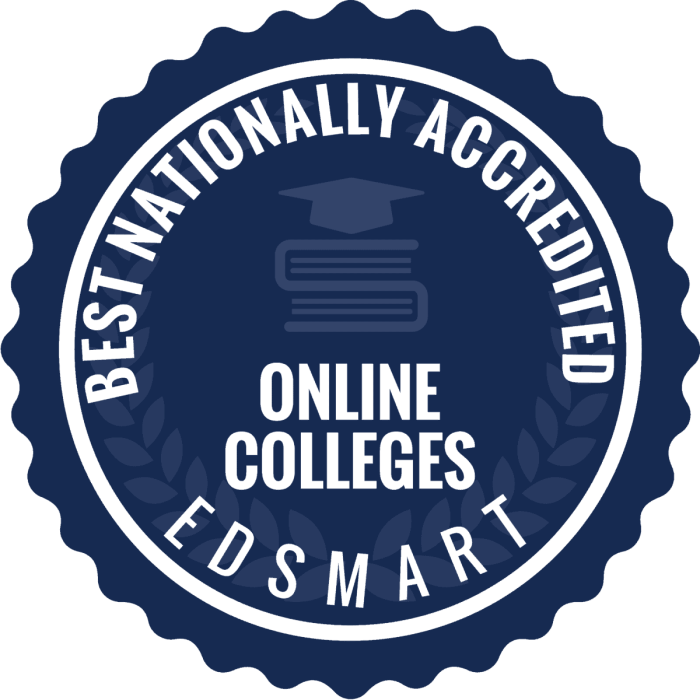
Embark on a journey through the world of accredited online education programs, where innovation meets accessibility, and learning knows no bounds. Dive into the realm of virtual classrooms and discover a wealth of knowledge waiting to be explored.
Explore the benefits, challenges, and strategies that shape the landscape of online education, paving the way for a brighter future in learning.
Online Education
Online education refers to academic programs or courses that are delivered over the internet, allowing students to access learning materials and interact with instructors remotely. Accredited online education programs are those that have been evaluated and approved by a recognized accrediting body, ensuring that they meet certain quality standards.
Examples of Institutions Offering Accredited Online Education
- University of Phoenix: Known for its online degree programs in various fields such as business, education, and healthcare.
- Capella University: Offers online programs in psychology, nursing, and information technology, among others.
- Southern New Hampshire University: Provides a wide range of online degrees, including in areas like finance, marketing, and social sciences.
Benefits of Online Education versus Traditional Classroom Learning
- Flexibility: Online education allows students to study at their own pace and convenience, ideal for those with busy schedules or commitments.
- Accessibility: Students can access course materials and lectures from anywhere with an internet connection, eliminating the need for commuting to a physical campus.
- Cost-effectiveness: Online education can be more affordable than traditional classroom learning, as it eliminates expenses like transportation and on-campus housing.
- Diverse learning opportunities: Online programs offer a wide range of courses and degrees, allowing students to choose from a variety of options that may not be available locally.
Psychology in Online Education

The role of psychology in designing effective online education programs is crucial as it helps in understanding how students learn and retain information in a digital environment. By incorporating psychological principles, educators can create engaging and impactful learning experiences for online learners.
Impact of Psychological Principles on Online Learning Outcomes
Psychological principles play a significant role in determining the success of online learning outcomes. Factors such as motivation, cognitive load, memory retention, and personalized learning experiences all influence how well students grasp and apply the concepts taught in online courses. Understanding these principles can lead to the development of more effective online education programs.
- Personalized Feedback: Providing personalized feedback to online learners based on their individual progress and learning styles can enhance motivation and engagement.
- Interactive Learning Activities: Incorporating interactive elements such as quizzes, discussions, and simulations can help maintain student interest and improve retention of information.
- Chunking Information: Breaking down complex information into smaller, more manageable chunks can reduce cognitive load and improve comprehension for online learners.
Strategies for Incorporating Psychology into Online Teaching Methods
In order to effectively incorporate psychology into online teaching methods, educators can implement the following strategies:
- Use Gamification: Introducing game elements such as points, badges, and leaderboards can increase motivation and participation among online learners.
- Utilize Social Learning: Encouraging collaboration and discussion among students through online forums and group projects can enhance learning outcomes.
- Provide Real-World Applications: Connecting theoretical concepts to real-world examples and case studies can help students understand the practical relevance of the material.
Special Education in Online Programs
Special education in online programs presents unique challenges and opportunities for students with disabilities. The flexibility of online learning can cater to individual needs, but it also requires specialized strategies to ensure effective learning.
Challenges of Delivering Special Education Online
- Accessibility: Ensuring that online platforms, materials, and resources are accessible to students with different types of disabilities.
- Individualized Support: Providing personalized assistance and accommodations to meet the diverse learning needs of students.
- Engagement: Keeping students motivated and engaged in a virtual learning environment, especially those who require extra support.
Opportunities of Delivering Special Education Online
- Flexibility: Allowing students to learn at their own pace and in a comfortable environment.
- Adaptive Technology: Utilizing specialized tools and technology to enhance learning experiences for students with disabilities.
- Collaboration: Facilitating communication and collaboration between students, teachers, and parents to create a supportive learning community.
Examples of Specialized Online Programs for Students with Disabilities
There are various online programs specifically designed for students with disabilities, such as:
- The National Deaf Center on Postsecondary Outcomes: Offers resources and support for deaf students pursuing higher education online.
- Learning Ally: Provides audiobooks and other assistive technology for students with visual impairments or reading disabilities.
- Do-IT (Disabilities, Opportunities, Internetworking, and Technology): Focuses on empowering individuals with disabilities through technology and education.
Importance of Individualized Education Plans in Online Special Education
Individualized Education Plans (IEPs) play a crucial role in online special education by:
- Outlining specific goals, accommodations, and support services tailored to each student’s unique needs.
- Guiding teachers and parents in implementing strategies to help students succeed in a virtual learning environment.
- Ensuring that students with disabilities receive the necessary resources and assistance to reach their full potential.
Standardized Tests in Online Education
Standardized tests play a crucial role in assessing the learning outcomes of students in online education programs. These tests help measure students’ understanding of the material, their critical thinking skills, and their ability to apply knowledge in different scenarios.
Role of Standardized Tests
- Standardized tests provide a consistent measure of student performance across different online courses and programs.
- They help educators identify areas where students may need additional support or resources.
- Results from standardized tests can be used to evaluate the effectiveness of online teaching methods and curriculum.
Challenges of Administering Standardized Tests Online
- Ensuring test security and preventing cheating can be more challenging in online settings compared to traditional classrooms.
- Technical issues such as internet connectivity problems or software compatibility issues can disrupt the testing process.
- Adapting standardized tests to fit the online format while maintaining reliability and validity can be a complex task.
Strategies for Preparing Students for Standardized Tests in Online Education
- Provide students with practice tests and study materials to familiarize them with the format and types of questions they may encounter.
- Offer online review sessions or tutorials to help students review key concepts and skills tested on standardized tests.
- Encourage students to develop good study habits and time management skills to effectively prepare for exams in an online environment.
Survival and Emergency Training Online

Online education programs have revolutionized the way individuals can access survival and emergency training. Through virtual platforms, individuals can now acquire essential skills and knowledge to handle various emergency situations effectively.
Certifications and Courses Available
- Basic First Aid and CPR Certification: Courses that teach fundamental first aid techniques and cardiopulmonary resuscitation (CPR) skills.
- Wilderness Survival Training: Programs that cover essential skills for surviving in the wilderness, such as shelter building, fire making, and navigation.
- Disaster Preparedness Courses: Training on how to prepare for and respond to natural disasters, including earthquakes, hurricanes, and floods.
Benefits of Virtual Simulations
Virtual simulations play a crucial role in enhancing survival and emergency training in online programs. They provide a realistic and interactive learning experience, allowing individuals to practice their skills in a safe environment.
Teaching Strategies for Online Education
Online education has become increasingly popular, especially in recent times. To effectively engage students in this digital learning environment, teachers must employ specific teaching strategies that promote interactive and collaborative learning experiences. Creating a sense of community and fostering strong student-teacher relationships are essential for student success in virtual classrooms.
Importance of Interactive and Collaborative Learning
Interactive and collaborative learning plays a crucial role in online education as it enhances student engagement and promotes active participation. By incorporating group projects, discussion forums, and virtual study sessions, teachers can create a dynamic learning environment that encourages students to interact with course materials and each other.
Tips for Fostering Student-Teacher Relationships
Building strong student-teacher relationships in virtual classrooms is vital for student success. Teachers can achieve this by providing personalized feedback, hosting virtual office hours, and maintaining open communication channels. By establishing a supportive and encouraging learning environment, teachers can help students feel connected and motivated to excel in their online studies.
Education Background and Training Online
When it comes to teaching in accredited online programs, having the right educational background and training is crucial. Online educators need to possess specific qualifications to effectively engage with students in the digital learning environment.
Types of Educational Backgrounds and Training
- Minimum of a Bachelor’s degree in Education or related field.
- Completion of courses or certifications in online teaching methodologies.
- Experience in educational technology and learning management systems.
- Continuing education in the field of online education to stay updated with the latest trends and practices.
Importance of Continuing Education for Online Educators
Continuing education is essential for online educators to enhance their skills and knowledge. It allows them to adapt to changing educational landscapes, improve their teaching methods, and better support their students’ learning needs.
Resources for Enhancing Skills and Knowledge in Online Teaching
- Online courses and webinars on virtual teaching strategies.
- Professional development programs offered by educational institutions.
- Networking with other online educators to share best practices and experiences.
- Reading research articles and publications on online education.
Education Books for Online Teaching
When it comes to effective online teaching methodologies, there are several educational books that can provide valuable insights and guidance for educators. These books not only address the unique challenges of online education but also offer strategies for enhancing professional development in this field.
Recommended Books for Online Teaching
- “The Online Teaching Survival Guide: Simple and Practical Pedagogical Tips” by Judith V. Boettcher and Rita-Marie Conrad
- “Essentials of Online Course Design: A Standards-Based Guide” by Marjorie Vai and Kristen Sosulski
- “Teaching in a Digital Age” by Tony Bates
Enhancing Professional Development with Educational Books
Educational books play a crucial role in the professional development of online educators by offering a deeper understanding of effective teaching strategies, technological tools, and pedagogical approaches specific to the online learning environment. By reading these books, educators can stay updated with the latest trends, research, and best practices in online education, ultimately improving their teaching skills and enhancing student learning outcomes.
As we conclude our exploration of accredited online education programs, we are reminded of the endless possibilities that lie ahead in the realm of virtual learning. From specialized programs to teaching strategies, the world of online education continues to evolve, offering new horizons for both educators and learners alike.
Detailed FAQs
What are the benefits of accredited online education programs?
Accredited online education programs offer flexibility, accessibility, and a wide range of course options tailored to individual needs.
How do standardized tests impact online learning outcomes?
Standardized tests help assess student progress and understanding in online education, providing valuable insights into their academic performance.
What teaching strategies are effective for engaging students in online education?
Interactive and collaborative learning environments, along with fostering student-teacher relationships, play a key role in engaging students in online education.






